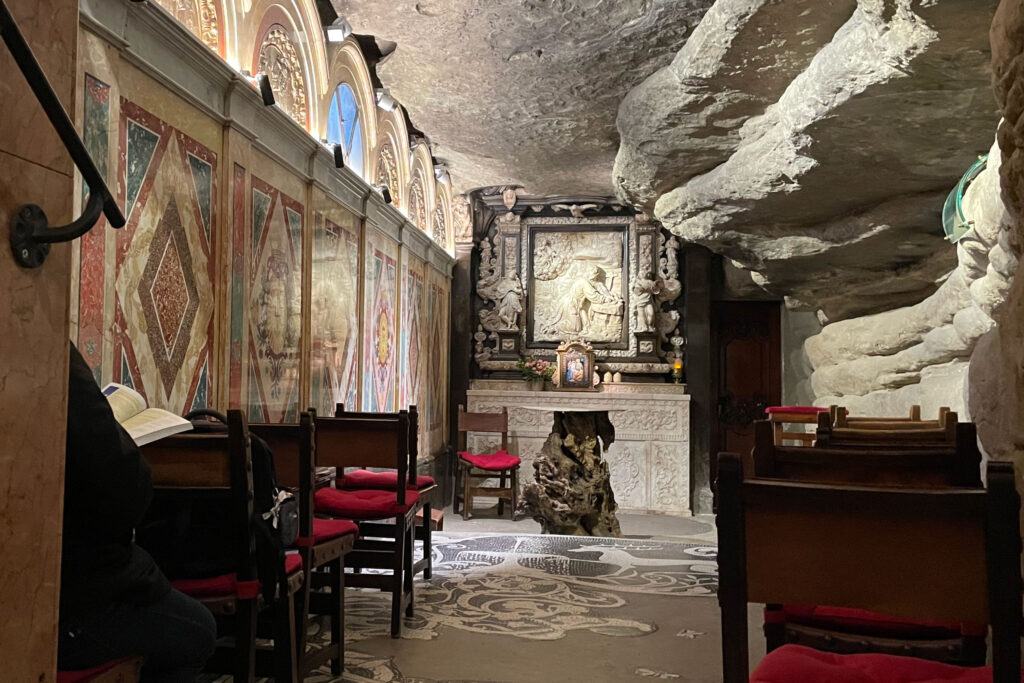
No one conducts PR campaigns from the recesses of a cave. For one, the internet is terrible. The acoustics are no good and – depending on where you are – you might need to worry about bears.
Fortunately, the cave I was in is now more chapel than cavern. And we weren’t in the part of Spain where bears are much of a concern.
But why worry about PR? My new book, “Cannonball Moments: Telling Your Story, Deepening Your Faith,” launched this week. Was it wise to leave the country with little-to-no access to email in the ten days leading up to publication? From a PR perspective, probably not.
But from a spiritual perspective? Absolutely.
I was on pilgrimage in Spain and Italy, praying at the Ignatian sites with folks from Creighton University in Omaha and Regis University in Denver. We celebrated Mass in the room where Ignatius experienced his conversion, stood before Our Lady of Montserrat – the very place where Ignatius laid down his sword and committed himself to God – and crossed an ancient bridge to sit on the banks of the Cardoner River, in awe and wonder at the mystical experience Ignatius himself had by that same body of water all those many years ago.
And, as you might have guessed, we prayed in the cave near Manresa where we’re told Ignatius wrote – and experienced firsthand – the “Spiritual Exercises.” (Take a look at the photo above.)
The cave itself is more of a rocky overhang; maybe enough shelter to avoid getting soaked in a rainstorm, but hardly what you’d image a cave to be. I wouldn’t call it cavernous. The space is shallow, open to the elements, harsh.
At least, I assume that’s how it was in Ignatius’ time, before it became a cozy first-floor chapel of the Jesuit-run spiritual center.
Regardless, it’s a holy place, a grace-filled place. You run your hands on the cool rock and imagine Ignatius doing the same, imagine him wondering at the vocation he’s now committed himself to living out. It’s a place where you can’t help but come face-to-face with your own vocation, your own life story.
And there, you meet God.
But Fr. Kevin Burke, SJ, who was presiding at Mass on the day in question, reminded us of something else: “This is a place of composition.”
Fr. Burke didn’t want us to forget that Ignatius literally wrote the “Exercises” there, in that place. It was a profound spiritual moment for Ignatius personally. But the work didn’t stop at the personal. It was also a profoundly significant moment of creativity that birthed a crucial piece of spiritual writing from which generations of people the world over have benefitted.
My ears perked up at those words: This is a place of composition. Was I to take something from this place for my own vocation as a writer? After all, that forthcoming publication date was ever-present in my mind. Perhaps.
But as I’ve continued to reflect on those words, something else occurs to me: The word “composition” has more than one meaning. And I wonder what we might learn from spending time sitting with our own composition.
What are we made of, composed of? What are the joys and sorrows that compose our own unique stories? Those experiences and insights and hard-won truths? When we look at our very selves, what is it that we see? What is the stuff of our lives?
After all, Ignatius himself spent not an insignificant amount of time in that cave worrying about his own composition – particularly, where he had fallen short of what he believed God expected of him.
But in the end, in that cave, Ignatius realized an essential truth: his was a God who couldn’t help delighting in all that he was and all that he would yet become.
That’s our God, too. God looks at us – at our composition – and smiles. God sees the intricacies of our stories, the tiny details we ourselves may have forgotten, and invites us back for a closer look. In taking that long, loving gaze at who we are and who we are yet called to become, we glimpse the composition of our lives and see utterly unique stories dripping with God’s grace.
That cave in Manresa is indeed a place of composition. But it’s not the only one. For me, my basement has a lot of those same qualities: poorly lit, cold and where I’ve done hours of writing, rewriting and soul searching. I’ve done the work of composition but – perhaps more importantly – recognized the work of composition that I already am. And therein we find God smiling.
Where might you find a place of composition? Where might you encounter our God who is delighting in you, God’s own great composition? And what, in your story, are you called to share as a result?
(And if you’re interested in learning more about my book, “Cannonball Moments: Telling Your Story, Deepening Your Faith,” you can do so here.)
